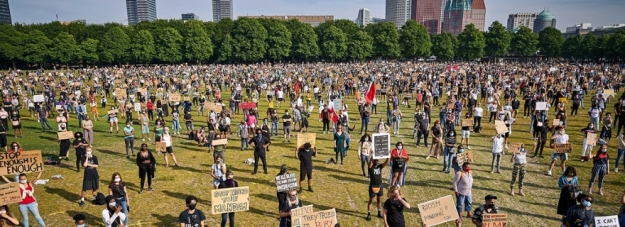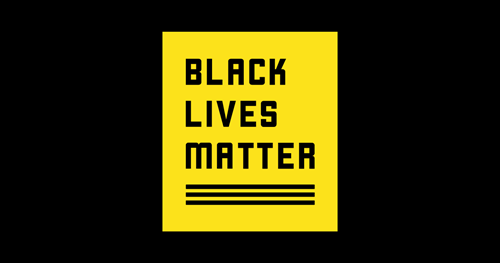I wasn’t looking forward to writing this post. I didn’t want to feel the pain, anger, and frustration that I knew would be part of writing it. I could have chosen not to write it. And that is the definition of my privilege.
If I get off social media and avoid the news I can even in these extraordinary times avoid being confronted by and having to think about racism. I can only do that because of my white privilege. Several times this week I have been brought to tears by what I watched online or read on social media and in the newspaper. It’s tempting to wish things go “back to normal”. For many black people, “normal” means having to deal with prejudice, being called names, and having to be afraid of the police. For black people, racism is always there. If things go back to normal the only difference is that it will no longer be in the news.
For Europeans, it’s tempting to think that racism happens far away or that it happened long ago. Slavery around the world officially ended around 150 years ago. In some places, it’s not even that long. The Netherlands was one of the last countries in Europe to abolish slavery, after being pressured to do so by the British.
Once slavery was officially abolished not much changed, other than people not officially being someone’s property anymore. Governments felt bad for the slave owners, who had been accumulating wealth for a long time by working people to death in inhumane circumstances without paying them or even treating them like human beings. Because slave owners had suffered so much (yes, I’m being sarcastic), governments compensated them for the loss of their “property”.
Slaves, who had nothing, were in many cases forced to continue work on the plantations of their former owners while still hardly receiving any payment for their work, let alone compensation for the fact that they had been working in inhumane conditions and for free for years.
Remember, this was all only around 150 years ago.
We have to be honest with ourselves and recognize that racism is still happening everywhere. The idea that black people are worth less or deserve less has been part of our culture for centuries and it has been institutionalized too. In The Netherlands, we feel like we’re nice and progressive but I’m a lot less likely to be stopped by the police or have my tax returns reviewed than a black person is. I’m never asked where I’m from and I’ve never been refused entrance to public transport. Oh, and there are still plenty of people who feel “black Piet” is folklore and because of that can’t be racist. If you are a white person I challenge you to watch this short video (Being Black by Jane Elliott) and answer the question that Jane Elliot is asking honestly. Then ask yourself why you deserve to get treated better than most black people. It’s the skin color that you happen to be born with that earns you that privilege. It’s not an achievement. It’s pure luck. And (institutionalized) racism.
Now is the time to stand up and speak out against the injustice of racism. You might feel that you are only one person. That you won’t be able to make much of a difference. But you can help. Everyone can.
- You could join one of the protest marches around the world. These huge marches are made up of a lot of people who are all just one person looking to make a change.
- If you are in a COVID-19 risk group and can’t be outside in crowds at the moment or if you’re simply not the marching type, you can go onto social media and make sure you extend your filter bubble a bit by also following some black people. Listen to them and believe them when they share their experiences. Even if it’s uncomfortable. Then share their stories. Your friends are probably not all following the same people, so by sharing you’re extending people’s reach.
If you’re not on social media you can help by calling out racism in your friends and family. Not by calling them a racist. No one has ever been convinced to change their opinion through name-calling. Have a calm conversation with them. Explain why you feel their views are problematic. - To be able to talk to your friends and family and to increase your understanding of the challenges black people face make sure you make an effort to educate yourself.
I have put together some resources that you can help to educate yourself. Many of these are mentioned all over social media at the moment and Google is your friend. If you don’t live in the US or the UK you might have to work a little bit harder to find local resources, especially if you want to donate.
If your thing is reading consider one or more of the following books. The first three are fiction, the last three are non-fiction.
- I Know Why the Caged Bird Sings – Maya Angelou
- Americanah – Chimamanda Ngozi Adichie
- To Kill a Mockingbird – Harper Lee
- How to Argue With a Racist – Adam Rutherford
- Why I’m No Longer Talking to White People About Race – Reni Eddo-Lodge
- How To Be an Antiracist – Ibram X. Kendi
The last title has an important message that you might have heard more often in these last few weeks. We are at a point where not being racist isn’t enough anymore. You have to be anti-racist. Which means taking a stand and calling out racism when you see it. At the very least.
You can also watch the following films or documentaries.
- 13th
- The Central Park Five
- I am Not Your Negro
- 3 1/2 Minutes, Ten Bullets
- And so many more that it’s easier to have a look yourself
Or if you prefer podcasts you could listen to
- About Race with Reni Eddo-Lodge
- Code Switch by the NPR
- The Stoop with Hana Baba and Leila Day
- Momentum: A Race Forward Podcast
- Scene on Radio Season 2 – Seeing White
You can also donate to help out if you have the financial means.
Whatever you do please help make sure things don’t go back to “normal”. Let’s work together to use the current momentum to bring about lasting change. It won’t be easy or quick, we have to undo hundreds of years of cultural and institutional racism. It won’t be comfortable either. We will make mistakes and be called out for it. It will hurt. Hopefully, we’ll learn from it and do better next time.
Also realize that we are so used to our privilege that equality might feel like oppression. Continue to challenge yourself. There is no excuse for treating one group of people better than another.
Black Lives Matter



Thank you Mirjam for your very thoughtful and informative post!
I have read two of the books you mentioned, both are wonderful!
The ones I have read are “I Know why the Caged Bird Sings” and “How to Kill a Mockingbird”
We all must take a stand against racism and Black Lives Matter! (always!)
Sending my best to you Mirjam ❤
LikeLiked by 1 person
Thank you Margie! ❤️
LikeLiked by 1 person